CarMax Bundle
How Does CarMax Dominate the Used Car Market?
The used car market is a battlefield, and CarMax has emerged as a formidable leader. Founded in 1993, CarMax revolutionized the automotive industry with its transparent, no-haggle pricing and vast inventory. But how does CarMax maintain its edge in this competitive environment? This analysis dives deep into the CarMax SWOT Analysis, exploring its position within the used car market.
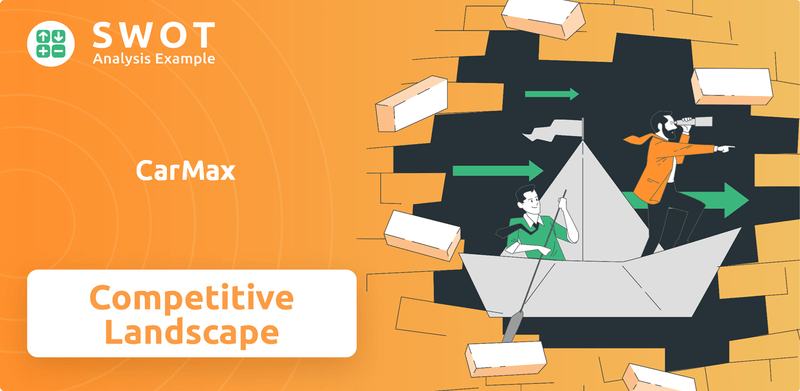
This exploration of the CarMax competitive landscape will dissect its key rivals and provide a thorough CarMax market analysis. We'll examine CarMax's business model, evaluating its strengths and weaknesses, and how it stacks up against its competitors. Understanding the CarMax competitors and their strategies is crucial to grasping the dynamics of the automotive industry.
Where Does CarMax’ Stand in the Current Market?
CarMax holds a significant position in the used vehicle retail industry, distinguished by its scale and unique business model. As of February 29, 2024, it was the largest retailer of used cars in the nation, operating 245 stores across 41 states. Its primary offerings include a wide selection of used vehicles, financing solutions through CarMax Auto Finance (CAF), extended protection plans, and vehicle reconditioning services.
The company's strategic approach has evolved, particularly with the adoption of an omnichannel retail model. This integration of physical stores with a robust online platform allows customers to complete transactions entirely online, in-store, or through a combination of both, catering to changing consumer preferences. This digital shift has been crucial in maintaining its competitive edge and broadening its reach. For fiscal year 2024, CarMax reported total revenues of $27.5 billion.
CarMax's market position is further solidified by its extensive geographic presence and integrated financing arm, setting it apart from many smaller, independent dealerships. The company's market share is distributed across various local and regional markets, where it competes with a diverse array of players within the used car market.
CarMax's core operations revolve around purchasing, reconditioning, and selling used vehicles. The company sources vehicles through trade-ins, auctions, and direct purchases from consumers. These vehicles undergo rigorous inspections and reconditioning processes to ensure quality. CarMax then sells these vehicles through its retail stores and online platforms, providing customers with a transparent and customer-centric buying experience.
CarMax offers a compelling value proposition to both buyers and sellers. For buyers, it provides a wide selection of vehicles, transparent pricing, and a no-haggle sales process. For sellers, CarMax offers a convenient way to sell their vehicles, often providing competitive offers and immediate payment. This focus on transparency, convenience, and customer satisfaction differentiates CarMax in the automotive industry.
In fiscal year 2024, CarMax sold 809,730 used vehicles through its retail channels and 530,074 wholesale vehicles. This significant sales volume underscores its strong market position within the used car market. CarMax's market share is substantial, though it varies across different geographic regions. The company's ability to maintain a high sales volume is a key indicator of its competitive strength.
CarMax's financial performance reflects its strong market position. The company's total revenues for fiscal year 2024 were $27.5 billion. This financial scale allows CarMax to invest in its operations, expand its reach, and enhance its customer offerings. The company's financial health is a key factor in its ability to compete effectively within the automotive industry.
CarMax's competitive advantages include its extensive geographic footprint, its strong brand reputation, and its integrated financing arm. The company's omnichannel retail model provides customers with flexibility and convenience. CarMax's focus on customer satisfaction and its transparent pricing model also contribute to its competitive edge. To learn more about CarMax's business model, check out Revenue Streams & Business Model of CarMax.
- Extensive store network across 41 states.
- Strong brand recognition and customer trust.
- Integrated financing solutions through CarMax Auto Finance (CAF).
- Commitment to a no-haggle pricing model.
CarMax SWOT Analysis
- Complete SWOT Breakdown
- Fully Customizable
- Editable in Excel & Word
- Professional Formatting
- Investor-Ready Format
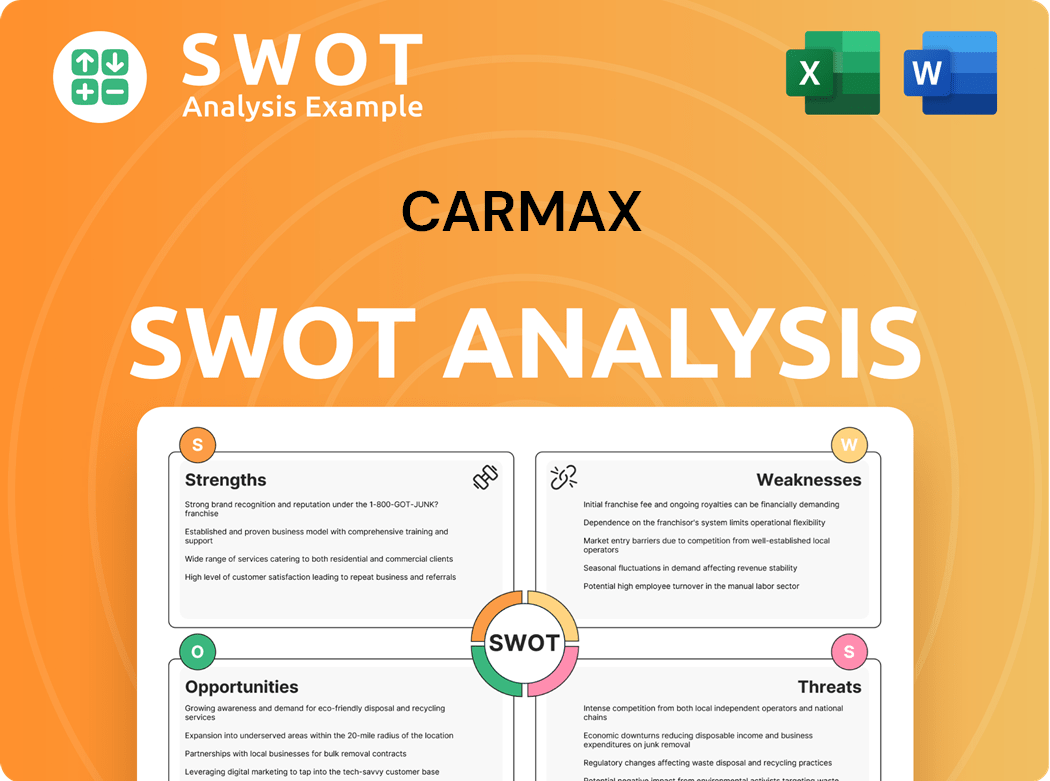
Who Are the Main Competitors Challenging CarMax?
The CarMax competitive landscape is shaped by a variety of players in the used car market. This includes traditional dealerships and emerging online platforms, all vying for market share. Understanding these competitors is crucial for assessing CarMax's position and strategies within the automotive industry.
CarMax's business model is constantly challenged by both direct and indirect competitors. The market analysis reveals a dynamic environment where innovation and customer experience are key differentiators. The company must continuously adapt to maintain its competitive edge.
The used car market is a dynamic sector with numerous competitors. CarMax's ability to navigate this environment is crucial for its continued success.
Direct competitors include large dealership groups, other national used car retailers, and digital-first used car marketplaces. These competitors offer similar products and services, directly competing for the same customer base. They often compete on price, selection, and customer service.
Indirect competitors include independent used car dealerships and private party sales. These competitors offer alternatives to CarMax, often with lower overhead and potentially more negotiable prices. They can influence market dynamics and customer choices.
Lithia Motors is a major player in the automotive retail sector. They operate a vast network of new and used car dealerships across the United States. They compete with CarMax through their extensive inventory and localized presence.
AutoNation is one of the largest automotive retailers in the U.S. They operate a substantial used vehicle business alongside their new car sales. AutoNation competes directly with CarMax through its broad selection and growing online capabilities.
Carvana and Vroom are key rivals in the digital realm. These companies offer fully online used car buying experiences, appealing to tech-savvy consumers. They challenge CarMax with their streamlined online processes and home delivery.
The competitive landscape is influenced by mergers and acquisitions. The emergence of new players focusing on specific niches, such as electric used vehicles, could also impact the traditional competitive dynamics. These factors shape the overall market conditions.
A detailed CarMax competitors analysis 2024 reveals the strengths and weaknesses of each player. Understanding these dynamics is crucial for strategic planning. The used car market is characterized by intense competition and evolving consumer preferences.
- Lithia Motors: Operates a vast network of dealerships. In 2024, Lithia Motors' revenue was approximately $32.7 billion.
- AutoNation: One of the largest automotive retailers. AutoNation's revenue in 2024 was around $27.4 billion.
- Carvana: A major online used car retailer. Carvana's revenue in 2024 was approximately $11.1 billion.
- Vroom: Another online retailer. Vroom's financial data for 2024 is limited due to restructuring.
- Independent Dealerships: Offer localized competition. Market share varies widely by region.
CarMax PESTLE Analysis
- Covers All 6 PESTLE Categories
- No Research Needed – Save Hours of Work
- Built by Experts, Trusted by Consultants
- Instant Download, Ready to Use
- 100% Editable, Fully Customizable
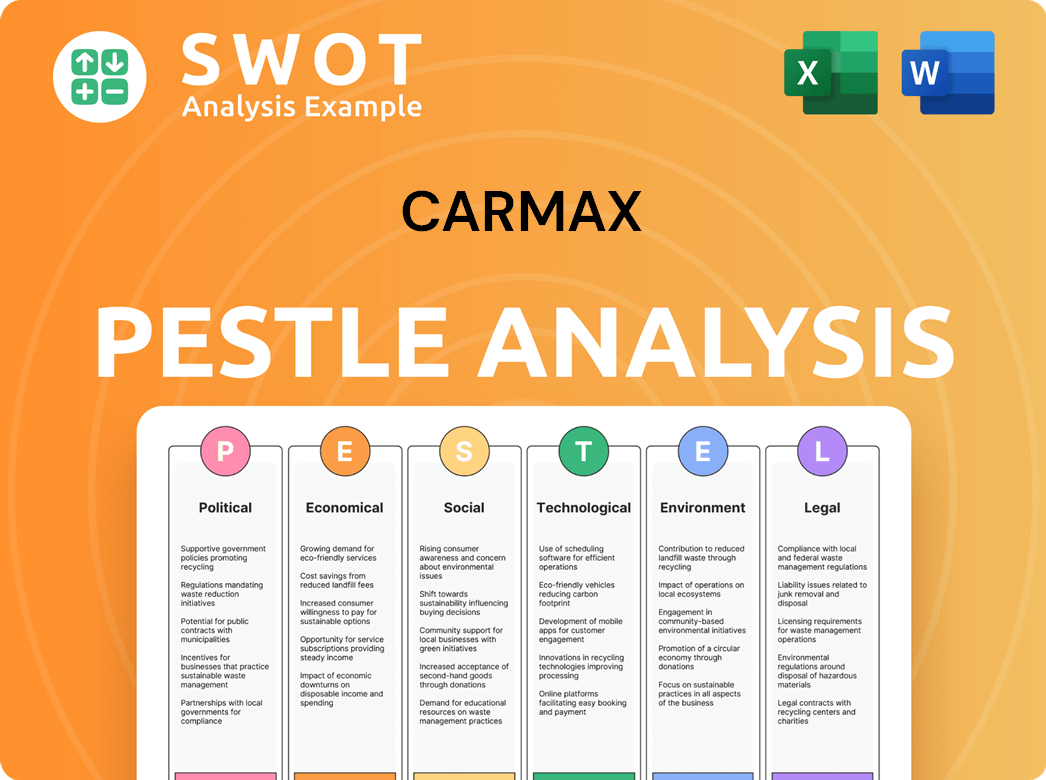
What Gives CarMax a Competitive Edge Over Its Rivals?
The competitive landscape of the automotive industry, especially within the used car market, is dynamic. Understanding the strengths and weaknesses of key players like CarMax is crucial for any market analysis. CarMax has carved a significant niche, and its business model offers several competitive advantages that set it apart from its rivals. This analysis will delve into these advantages, providing insights into how CarMax maintains its market position in a competitive environment.
CarMax's strategic moves and operational efficiencies have allowed it to thrive. These include its no-haggle pricing, extensive inventory, and integrated financing options. These strategies not only attract customers but also build trust and streamline the buying process. As the automotive industry evolves, CarMax's adaptability, particularly its omnichannel retail strategy, positions it well for future growth and sustained competitive edge. For those interested in the company's financial health, insights can be found by exploring Owners & Shareholders of CarMax.
The company's approach to customer service and its commitment to transparency are vital in the used car market. CarMax's focus on creating a positive customer experience, combined with its robust infrastructure, has built a strong brand reputation. This reputation, along with its financial performance, is a key factor in its ability to compete effectively.
CarMax's no-haggle pricing model is a significant differentiator, promoting transparency and trust. This approach contrasts with the traditional dealership experience, reducing customer anxiety. The 30-day money-back guarantee (up to 1,500 miles) further enhances the buying experience.
CarMax's vast inventory, including a wide selection of used vehicles across its stores and online platform, is a key strength. As of February 29, 2024, this extensive selection allows customers to find the exact vehicle they desire. CarMax's reconditioning process ensures vehicle quality and reliability, boosting consumer confidence.
CarMax Auto Finance (CAF) is a significant competitive differentiator, providing financing solutions directly to customers. This streamlines the purchase process and offers competitive rates. In fiscal year 2024, CAF originated 44.5% of CarMax's retail used vehicle unit sales.
CarMax's early adoption and continuous investment in an omnichannel retail strategy is a crucial advantage. This combines physical stores with a seamless online experience, offering customers flexibility. This adaptability to evolving consumer preferences provides sustainable advantages.
CarMax's competitive advantages include its transparent pricing, extensive inventory, integrated financing, and omnichannel retail strategy. These factors contribute to its strong market position. CarMax's scale and established infrastructure create high barriers to entry for competitors.
- No-Haggle Pricing: Fosters trust and transparency.
- Vast Inventory: Provides a wide selection of vehicles.
- Integrated Financing: Streamlines the purchase process.
- Omnichannel Strategy: Offers flexibility and convenience.
CarMax Business Model Canvas
- Complete 9-Block Business Model Canvas
- Effortlessly Communicate Your Business Strategy
- Investor-Ready BMC Format
- 100% Editable and Customizable
- Clear and Structured Layout
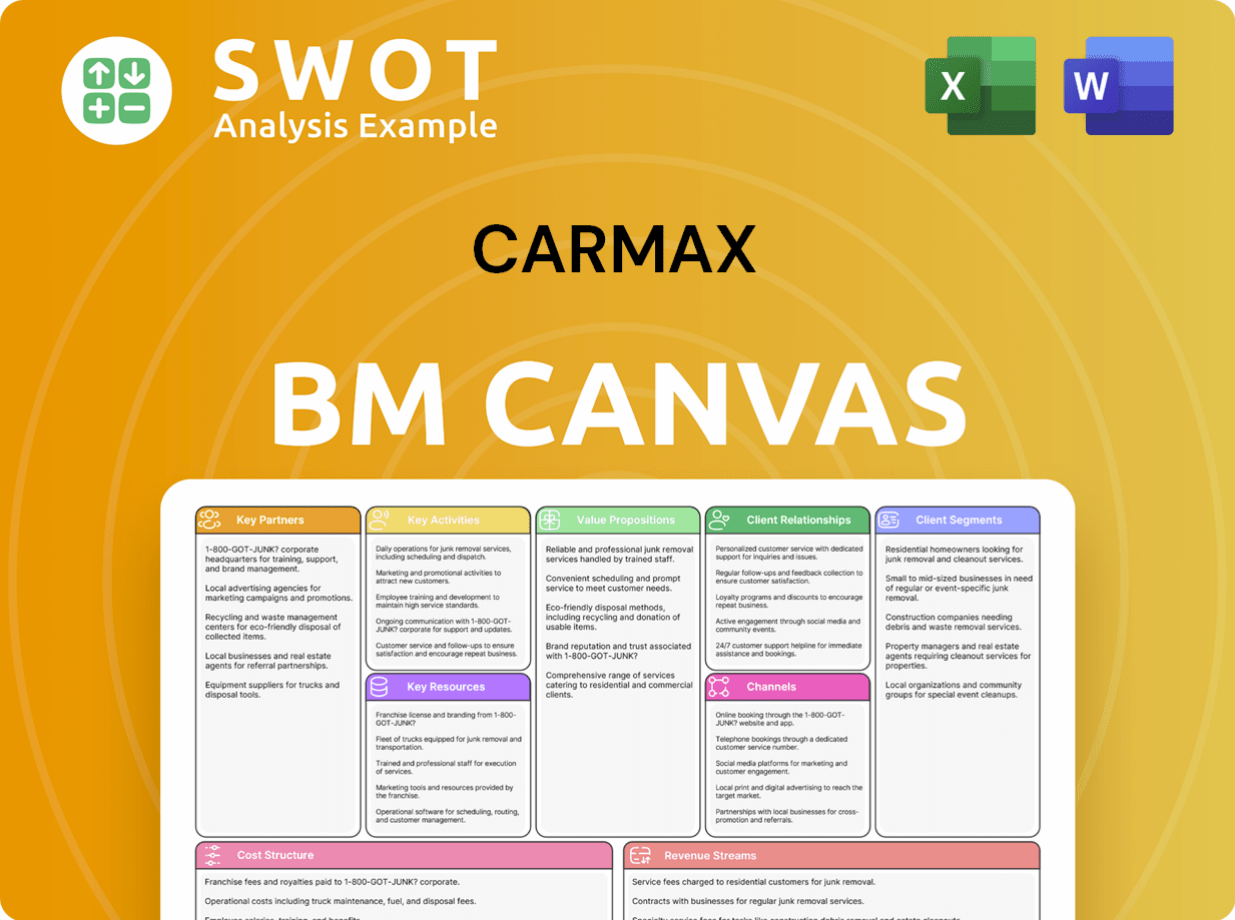
What Industry Trends Are Reshaping CarMax’s Competitive Landscape?
The CarMax competitive landscape is currently shaped by significant industry trends, future challenges, and emerging opportunities. The used car market is evolving rapidly, influenced by technological advancements, shifts in consumer behavior, and economic factors. Understanding these dynamics is crucial for assessing CarMax's position and future prospects within the automotive industry.
Several risks and opportunities are intertwined. Supply chain disruptions, regulatory changes, and competition from both traditional and digital players pose challenges. However, the rise of electric vehicles (EVs), the potential for service expansion, and the continued growth of online retail offer significant opportunities for growth. A thorough CarMax market analysis is essential to navigate these complexities and make informed decisions.
Digital retail is a key trend, with consumers increasingly expecting seamless online purchasing experiences. The adoption of electric vehicles (EVs) is growing, creating new market segments. Regulatory changes and economic shifts, such as interest rate fluctuations, also play a significant role in the used car market.
Ongoing supply chain disruptions can affect vehicle availability and pricing. Aggressive pricing strategies from competitors, including digital-first companies, intensify competition. The potential disruption from vehicle subscription models poses a threat to traditional ownership. Increased interest rates can also impact consumer affordability.
Expanding service offerings, such as maintenance and repairs, can boost revenue. Further integration of online and in-store experiences enhances customer convenience. Strategic partnerships, for example, with EV charging networks, could be beneficial. Focusing on data analytics to personalize customer experiences and optimize inventory management is also critical.
Investing in its omnichannel platform remains essential for CarMax. Strategic expansion into the used EV market is a key area for growth. Leveraging data analytics to personalize customer experiences and optimize inventory management is crucial. Adapting to changing consumer preferences and market dynamics is also necessary.
CarMax's ability to adapt to industry trends and capitalize on opportunities is crucial for its long-term success. Understanding the competitive landscape, including CarMax competitors, is essential. The company must also mitigate potential threats while focusing on customer satisfaction and operational efficiency. Read more about the Growth Strategy of CarMax.
- Focus on digital retail and omnichannel integration.
- Expand into the used EV market.
- Enhance service offerings and customer experience.
- Manage supply chain and economic risks.
CarMax Porter's Five Forces Analysis
- Covers All 5 Competitive Forces in Detail
- Structured for Consultants, Students, and Founders
- 100% Editable in Microsoft Word & Excel
- Instant Digital Download – Use Immediately
- Compatible with Mac & PC – Fully Unlocked
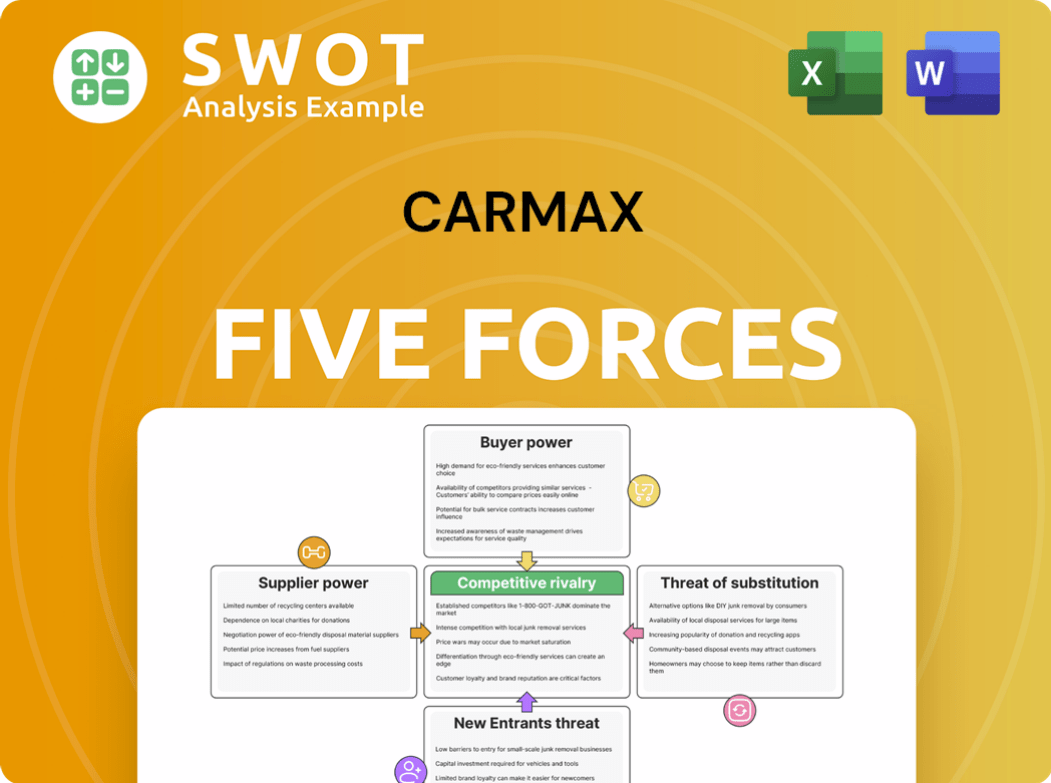
Related Blogs
- What are Mission Vision & Core Values of CarMax Company?
- What is Growth Strategy and Future Prospects of CarMax Company?
- How Does CarMax Company Work?
- What is Sales and Marketing Strategy of CarMax Company?
- What is Brief History of CarMax Company?
- Who Owns CarMax Company?
- What is Customer Demographics and Target Market of CarMax Company?
Disclaimer
All information, articles, and product details provided on this website are for general informational and educational purposes only. We do not claim any ownership over, nor do we intend to infringe upon, any trademarks, copyrights, logos, brand names, or other intellectual property mentioned or depicted on this site. Such intellectual property remains the property of its respective owners, and any references here are made solely for identification or informational purposes, without implying any affiliation, endorsement, or partnership.
We make no representations or warranties, express or implied, regarding the accuracy, completeness, or suitability of any content or products presented. Nothing on this website should be construed as legal, tax, investment, financial, medical, or other professional advice. In addition, no part of this site—including articles or product references—constitutes a solicitation, recommendation, endorsement, advertisement, or offer to buy or sell any securities, franchises, or other financial instruments, particularly in jurisdictions where such activity would be unlawful.
All content is of a general nature and may not address the specific circumstances of any individual or entity. It is not a substitute for professional advice or services. Any actions you take based on the information provided here are strictly at your own risk. You accept full responsibility for any decisions or outcomes arising from your use of this website and agree to release us from any liability in connection with your use of, or reliance upon, the content or products found herein.